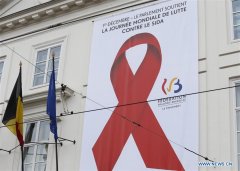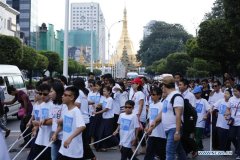Complacency risks undermining gains in combating HIV/AIDS in
By Matt Burgess
SYDNEY, Dec. 1 (Xinhua) -- The world has taken great steps to combat the scourge of HIV/AIDS, however developing countries are still struggling, a stark reminder on World AIDS Day.
Since the beginning of the epidemic the World Health Organization (WHO) estimates more than 70 million people have been infected with virus that destroys a patient's immune system, making them more susceptible to other illnesses like Tuburculosis or other common and opportunistic infections.
In 2015 alone, it was estimated 1.1 million people died as a result of HIV/AIDS, while 36.7 million people were living with the virus.
While the WHO estimates HIV/AIDS prevalence in the Western Pacific is 0.1 percent in people aged 15-49 years, Papua New Guinea (PNG) continues to be in its grip with 0.8 percent of the population - or 42,000 people - infected with the virus.
"Across the world, we know many people who have got the virus can now survive, they can get anti-retrovirals, they just need to take pills every single day," the United Nations (UN) resident director to PNG Roy Trivedy told Xinhua via telephone on Thursday.
But, there is lack of consistent supply of the life saving drugs, either from shortfalls or ongoing funding issues in developing countries, Trivedy said.
"That is causing problems across many parts of the world, including of course in many places in Africa - that's still where the largest numbers of people infected (are) - but also places like PNG, lower middle income countries where there isn't that kind of consistent supply of anti-retrovirals."
It is a stark contrast to Australia, where the New South Wales state government on Thursday lauded that it is on track to achieve the virtual elimination of HIV transmission by 2020.
A state government report released in conjunction with World Aids Day showed only 70 people were diagnosed with HIV in the three months to September 30 - the lowest level of new cases in four years - despite a 27 percent increase in testing.
"It's encouraging to see the four measures of success in the fight against HIV - prevention, testing, new diagnoses and treatment - are all heading in the right direction," NSW Health Minister Jillian Skinner said in a statement.
That message of using protection such as condoms, making the right choices and not having multiple partners is beginning to fall on deaf ears in PNG, Trivedy said, never mind the fiscal issues the Pacific nation's health department is facing.
Local media reports suggest PNG is facing a shortage of condoms, while the fiscal issues of a nation going through one of its worst recessions in history has caused widespread cutbacks to health services in remote areas and anti-retroviral availabilty. It is estimated 50 percent of HIV/AIDS patients have access to the drugs.
The Indian High Commission in Port Moresby has agreed to supply anti-retrovials to the PNG government over the coming year, but that still does not fix the ongoing supply issues. There is also the worry of some funding reductions by some donors which could put any gains to combating the virus in jeopardy, Trivedy said.
But, there is significant Non-Government Organization (NGO) work being carried out, funded through the Global Fund. Australia - the world's largest aid donor in the Pacific - has pledged 220 million Australian dollars (162.76 million U.S. dollars) to the fund's 2017-2019 replenishment, as HIV/AIDS related deaths have fallen 45 percent over the past 10 years in areas it has been active.
"Australia's overseas development assistance contributes to prosperity and stability in our region and is targeted at health and security challenges - including AIDS," Australia's Minister for International Development and the Pacific, Senator Concetta Fierravanti-Wells told Australia's World AIDS Day Parliamentary Breakfast.
"Helping countries address health challenges is in our national interest."
"Australia benefits if citizens in our region are healthy, well-educated and making an economic contribution."
Responding to the epidemic is one of PNG's highest priorities, PNG Health Minister Michael Malabag said in his World AIDS Day message on Thursday, vowing to address the many infrastructure, staffing and supply problems in the health system.
"We have made significant inroads in terms of our response but many challenges persist and gains are still fragile," Malabag said.
The real part of the challenge however is that "there is almost complacency that sets in when people start to say yeah well all those messages have been going around for quite some time and everybody knows that'," Trivedy said.
"(But) a lot of people don't get those messages, and you need to keep repeating it, you need to keep finding new ways of getting those messages to people throughout."
The UN's Sustainable Development Goals have a zero target for HIV/AIDS transmission by 2030 in which progress had been made, however over the last few years, those gains had been slightly eroded.
"We need to take action now to correct that," Trivedy said.















